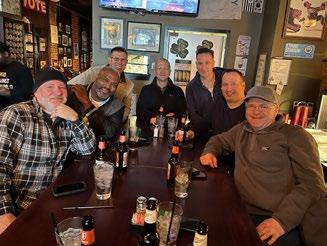
2 minute read
SPOTLIGHT: SERGEANT JIM MARABLE
In this issue of the Investigative Quarterly, the IHIA proudly spotlights Sergeant Jim Marable of the Columbus Police Department in Columbus, Ohio. Jim is a great supporter of the IHIA and here is a little bit about him:

I had originally planned on a military career and had never even considered law enforcement. ROTC seemed to be a great way to pay for college, while pursuing a military career, so I enlisted in the Air Force to qualify for an ROTC scholarship. Then while attending The Ohio State University, I found myself watching the Berlin Wall fall with my ROTC classmates. Within a surprisingly short time, the military ceased to appear as a promising career field. Suddenly, I found myself in search of a new career and a way to pay for college. I happened to know a few Columbus Police officers and they encouraged me to apply. After a few ride-alongs, which I thoroughly enjoyed, and learning the City of Columbus has a tuition reimbursement program, I was sold and joined the Columbus Division of Police in September of 1991.
As an officer, I mainly worked third shift as a Patrol officer and an Auto Theft detective. Third shift was appealing because it allowed me to finish my bachelor’s degree and complete an MBA. Homicide has always interested me and shortly before being promoted to Sergeant, a Homicide assignment finally made it down to me. With my promotion anticipated in less than six months, the third shift Homicide Sergeant, Dana Norman, for whom I have enormous respect, and I discussed the possibilities. Sgt. Norman explained that by the time I would have been fully trained as a Homicide detective, I would have been promoted to Sergeant and moved back to Patrol. Therefore, out of respect for Sgt. Norman and the incumbent Homicide detectives, I reluctantly passed on the opportunity. After being promoted, I went back to Patrol and also held assignments in Property Crimes, Community Liaison, Internal Affairs and IN/TAC (the Narcotics Tactical Entry Team) before another opportunity to serve in Homicide presented itself.
In addition to these full-time assignments, I also had the privilege of holding collateral duty assignments as an Officer Support and Hostage Negotiation Team member. Our Officer Support Team is made up of officers who have survived critical incidents, in my case it was an officer involved shooting. Although this was a horrendous experience, it provided me with a unique perspective on these incidents. The need for a thorough professional investigation, coupled with immediate psychological support for the involved personnel, cannot be understated. We are fortunate to have a very highly regarded Hostage Negotiation Team. The team is on call 24/7 and deploys with SWAT anytime there is a barricaded individual. To maintain our proficiency, team members travel throughout the year attending various conferences. Annually, the team hosts a conference of our own (which is no small undertaking) that attracts attendees from throughout the Midwest.
Finally, several years ago, I had the opportunity to transfer to Homicide. Since I never held an assignment in Homicide, I had, and still have, a great deal to learn. I read as many textbooks and attend as many training courses related to death investigation as I can. One of the frequent complaints I hear from the team is how difficult it is to find high quality homicide specific training, a perception that mirrors my own experience. Hearing our concerns, the Homicide Commander sent five of us to the IHIA’s symposium, which allowed us to begin forging a relationship with the IHIA to meet our training needs. To date, Homicide has been both very challenging and rewarding. The Homicide Team is made up of some phenomenal people who seemingly work miracles on a regular basis. Their incredible work and dedication never ceases to amaze me. Of course, none of these opportunities would have been possible if it were not for the support and patience of a very understanding woman, Jane.


